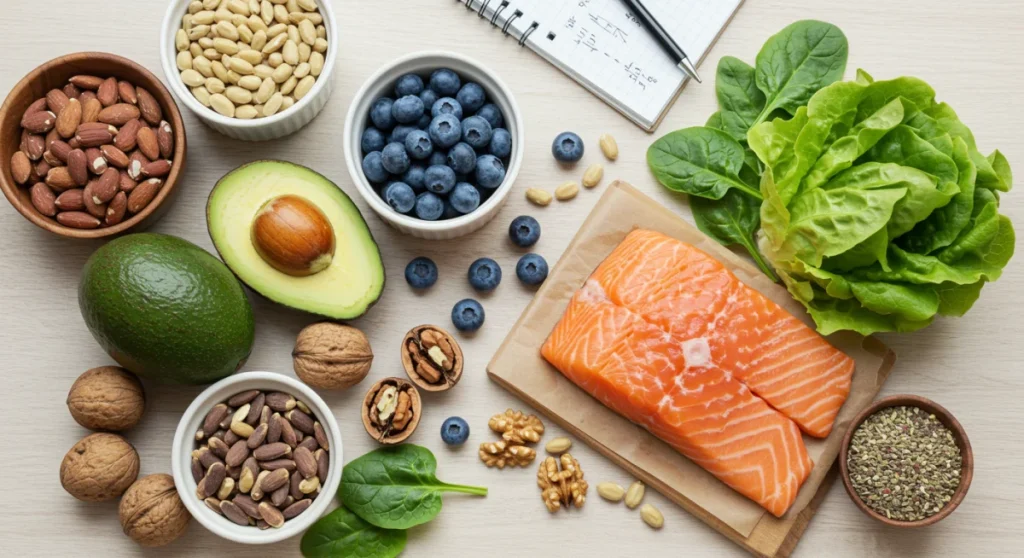Brain Health: 9 Neuro-Nutritional Strategies for 2025

Optimizing brain health through nutrition involves targeted strategies that enhance cognitive function, memory, and overall mental well-being in 2025 by focusing on specific neuro-nutrients and dietary patterns.
Are you looking to sharpen your mind and boost your cognitive abilities? In 2025, the focus on brain health nutrition has never been more critical, offering practical solutions and insider knowledge to enhance your mental performance. This article delves into nine neuro-nutritional strategies designed to elevate your brain power, ensuring you stay ahead in an ever-demanding world.
The Foundation of Brain Health: Why Nutrition Matters
Our brains, though only about 2% of our body weight, consume a disproportionate 20% of our daily caloric intake. This remarkable organ demands a constant supply of high-quality fuel to function optimally. Just as a high-performance car requires premium gasoline, our brains thrive on a diet rich in specific nutrients that support neuronal communication, protect against oxidative stress, and facilitate neurogenesis.
Understanding the intricate relationship between what we eat and how we think is the first step toward achieving superior cognitive function. Modern research continually uncovers new facets of this connection, revealing how diet can influence everything from memory retention and focus to mood regulation and long-term neurological health. It’s not merely about avoiding unhealthy foods, but actively incorporating elements that nourish and protect our most vital organ.
The Brain’s Nutritional Demands
The brain’s complex architecture and continuous activity mean it has unique nutritional requirements. It needs specific fats for cell membranes, proteins for neurotransmitter synthesis, and a steady supply of glucose for energy, all delivered through a well-balanced diet. Without these essential building blocks, cognitive function can decline, leading to issues with concentration, memory, and even emotional stability.
- Energy Supply: Glucose is the primary fuel source, but its delivery needs to be stable to avoid energy crashes.
- Structural Integrity: Healthy fats, especially omega-3s, are crucial for maintaining cell membrane flexibility and integrity.
- Neurotransmitter Production: Amino acids from proteins are precursors to vital neurotransmitters like serotonin and dopamine.
- Antioxidant Defense: Vitamins and minerals act as antioxidants, protecting brain cells from damage.
In essence, the food choices we make daily directly impact our brain’s ability to process information, form new memories, and maintain emotional resilience. Prioritizing brain-healthy eating is an investment in both our short-term cognitive performance and our long-term neurological well-being.
Strategy 1: Embrace Omega-3 Fatty Acids
Omega-3 fatty acids, particularly DHA and EPA, are paramount for brain health. These essential fats are structural components of brain cell membranes, playing a critical role in brain development, cognitive function, and reducing inflammation. They are vital for maintaining the fluidity of cell membranes, which is essential for efficient communication between brain cells.
Insufficient intake of omega-3s has been linked to various cognitive impairments and neurological disorders. Incorporating these fats into your diet can significantly enhance memory, learning capabilities, and even mood stability. The brain greatly benefits from a consistent supply of these healthy fats.
Sources and Benefits of Omega-3s
While supplements are an option, obtaining omega-3s from whole food sources is often more beneficial due to the synergistic effects of other nutrients present. Fatty fish are the richest dietary source, but plant-based options also exist, offering alternatives for diverse dietary preferences.
- Fatty Fish: Salmon, mackerel, sardines, and trout are excellent sources of DHA and EPA. Aim for at least two servings per week.
- Flaxseeds and Chia Seeds: These plant-based seeds provide alpha-linolenic acid (ALA), a precursor to EPA and DHA, though the conversion rate in the body can vary.
- Walnuts: Another good plant-based source of ALA, walnuts also offer antioxidants and other brain-supportive nutrients.
Regular consumption of omega-3 rich foods can lead to improved cognitive function, better mood regulation, and a reduced risk of age-related cognitive decline. This strategy is a cornerstone of any brain-boosting dietary plan.
Strategy 2: Prioritize Antioxidant-Rich Berries and Dark Leafy Greens
Oxidative stress is a major contributor to brain aging and neurodegenerative diseases. Antioxidants combat this stress by neutralizing harmful free radicals, thereby protecting brain cells from damage. Berries and dark leafy greens are powerhouses of these protective compounds, making them indispensable for cognitive enhancement.
These foods are packed with flavonoids, anthocyanins, and other polyphenols that have been shown to cross the blood-brain barrier and exert direct neuroprotective effects. Their regular consumption can improve memory, learning, and overall brain function.

Choosing a variety of colors in your produce ensures a broad spectrum of antioxidants. Think beyond just blueberries; raspberries, strawberries, and blackberries all offer unique benefits.
The Power of Phytochemicals
Phytochemicals found in these foods do more than just fight free radicals. They can also enhance communication between brain cells, increase neurogenesis (the growth of new brain cells), and reduce inflammation, all of which are crucial for maintaining cognitive vitality.
- Blueberries: Often hailed as the “brain berry” due to their high anthocyanin content, known to improve memory and motor skills.
- Spinach and Kale: Rich in vitamin K, lutein, folate, and beta-carotene, these greens are linked to slower cognitive decline.
- Broccoli: Contains vitamin K and choline, which are important for memory and nerve health.
Incorporating a daily serving of berries and several servings of dark leafy greens can provide a significant boost to your brain’s resilience and cognitive performance, making them essential components of a neuro-nutritional strategy.
Strategy 3: Integrate Whole Grains for Stable Energy
The brain requires a constant, steady supply of glucose to function optimally. While simple sugars provide a quick burst of energy, they often lead to subsequent energy crashes and can negatively impact cognitive function. Whole grains, on the other hand, offer complex carbohydrates that release glucose slowly into the bloodstream, ensuring a stable and sustained energy supply for the brain.
This steady energy flow prevents the highs and lows associated with refined carbohydrates, supporting sustained concentration, improved mood, and better cognitive performance throughout the day. Whole grains also provide essential B vitamins, which are crucial for nerve function and neurotransmitter synthesis.
Choosing the Right Grains
Not all grains are created equal. The key is to opt for whole, unprocessed grains over their refined counterparts. Refined grains, such as white bread and pasta, have had their beneficial fiber and nutrient-rich germ removed, leaving mostly simple carbohydrates.
- Oats: A fantastic source of soluble fiber, oats help stabilize blood sugar and provide a sustained energy release.
- Brown Rice: A complex carbohydrate that delivers energy slowly and provides essential minerals.
- Quinoa: A complete protein and a good source of fiber, iron, and magnesium, all beneficial for brain health.
- Whole Wheat Bread/Pasta: Look for products explicitly labeled “100% whole wheat” to ensure you’re getting the full benefits.
By making the switch to whole grains, you are providing your brain with the consistent fuel it needs to perform at its best, avoiding the cognitive dips that come with fluctuating blood sugar levels.
Strategy 4: Harness the Power of Nuts and Seeds
Nuts and seeds are miniature powerhouses of nutrients essential for brain health. They are rich in healthy fats, protein, fiber, and a wide array of vitamins and minerals, including vitamin E, magnesium, and zinc. These components work synergistically to protect brain cells, improve cognitive function, and support overall neurological well-being.
Vitamin E, in particular, is a potent antioxidant that helps protect brain cell membranes from oxidative damage. Magnesium plays a role in nerve transmission and muscle contraction, while zinc is vital for neurotransmitter function and memory.
Nutritional Benefits and Best Choices
Regular consumption of a variety of nuts and seeds can contribute significantly to a brain-healthy diet. They make excellent snacks and can be easily incorporated into meals.
- Walnuts: Stand out for their high content of ALA (an omega-3 fatty acid) and antioxidants.
- Almonds: Rich in vitamin E, which is linked to reduced cognitive decline.
- Pecans: Another good source of vitamin E and antioxidants.
- Pumpkin Seeds: Packed with zinc, magnesium, copper, and iron, essential for memory and nerve signaling.
- Sunflower Seeds: Provide vitamin E and selenium, an important antioxidant.
A handful of mixed nuts and seeds daily can provide a substantial nutritional boost for your brain, contributing to better memory, focus, and protection against age-related cognitive issues.
Strategy 5: Incorporate Lean Proteins for Neurotransmitter Support
Proteins are fundamental to every cell in the body, including brain cells. They are broken down into amino acids, which are the building blocks for neurotransmitters – the chemical messengers that allow brain cells to communicate with each other. A sufficient intake of lean proteins is crucial for maintaining optimal neurotransmitter balance, which in turn influences mood, concentration, and learning.
Without adequate protein, the production of essential neurotransmitters like serotonin, dopamine, and norepinephrine can be compromised, potentially leading to issues such as fatigue, poor concentration, and mood swings. Lean protein sources also provide sustained energy without the heavy fat content that can slow down digestion and cognitive processing.
Optimal Protein Sources
Choosing lean protein sources ensures you get the necessary amino acids without excessive saturated fats. Variety is key to obtaining a full spectrum of amino acids.
- Fish (especially fatty fish): Provides both protein and brain-boosting omega-3s.
- Chicken and Turkey (skinless): Excellent sources of lean protein with a good amino acid profile.
- Eggs: A complete protein source, also rich in choline, which is vital for memory and brain development.
- Legumes (beans, lentils): Plant-based protein sources that also offer fiber and complex carbohydrates.
- Tofu and Tempeh: Versatile plant-based proteins, particularly beneficial for vegetarians and vegans.
Ensuring your diet includes a variety of lean protein sources throughout the day will support robust neurotransmitter production, leading to improved mood, sharper focus, and enhanced cognitive function.
Strategy 6: Embrace the Mediterranean Diet Pattern
Instead of focusing on isolated nutrients, adopting a holistic dietary pattern like the Mediterranean diet can profoundly impact brain health. This eating style emphasizes whole, unprocessed foods, healthy fats, and a diversity of plant-based ingredients, all of which work synergistically to support cognitive function and protect against neurological decline.
Numerous studies have linked adherence to the Mediterranean diet with a reduced risk of cognitive impairment, dementia, and improved overall brain health. It’s not just a diet; it’s a lifestyle that promotes longevity and mental vitality.
Key Components and Benefits
The Mediterranean diet is characterized by its rich intake of fruits, vegetables, whole grains, nuts, seeds, and olive oil, with moderate consumption of fish and poultry, and limited red meat and sweets.
- Abundant Fruits and Vegetables: Provides a wide range of antioxidants, vitamins, and minerals.
- Olive Oil as Primary Fat Source: Rich in monounsaturated fats and polyphenols, offering anti-inflammatory and neuroprotective benefits.
- Legumes and Nuts: Excellent sources of plant-based protein, fiber, and healthy fats.
- Fish and Seafood: Regular intake ensures sufficient omega-3 fatty acids.
Adopting the Mediterranean diet provides a comprehensive approach to brain health, integrating multiple beneficial food groups into a delicious and sustainable eating pattern.
Strategy 7: Optimize Gut Health with Probiotics and Prebiotics
The gut-brain axis is a bidirectional communication pathway between the central nervous system and the enteric nervous system, which governs the gut. A healthy gut microbiome, rich in beneficial bacteria, plays a crucial role in brain function, influencing mood, stress response, and cognitive processes. This connection highlights the importance of optimizing gut health for overall neurological well-being.
An imbalance in gut flora, known as dysbiosis, has been linked to various neurological and psychiatric conditions. By nurturing a diverse and healthy gut microbiome through diet, we can positively impact brain health.

Foods for a Healthy Gut-Brain Axis
Incorporating both probiotics (beneficial bacteria) and prebiotics (food for these bacteria) into your diet is essential for a thriving gut microbiome.
- Probiotic-rich Foods:
- Fermented foods: Yogurt, kefir, sauerkraut, kimchi, and kombucha introduce beneficial bacteria into the gut.
- Prebiotic-rich Foods:
- Fiber-rich foods: Onions, garlic, leeks, asparagus, bananas, and whole grains feed the beneficial bacteria, promoting their growth and activity.
Supporting your gut health with a diet rich in probiotics and prebiotics can lead to improved mood, reduced anxiety, and enhanced cognitive function, underscoring the deep connection between our digestive system and our brain.
Strategy 8: Stay Hydrated for Peak Brain Performance
Water is often overlooked in discussions about nutrition, yet it is absolutely critical for brain function. The brain is approximately 75% water, and even mild dehydration can significantly impair cognitive abilities. Symptoms of dehydration, such as fatigue, dizziness, and difficulty concentrating, are direct indicators of its impact on brain performance.
Adequate hydration ensures optimal blood flow to the brain, facilitating the delivery of oxygen and nutrients, and the removal of waste products. It also plays a role in nerve signal transmission and overall brain cellular function.
Simple Hydration Habits
Making hydration a priority doesn’t require complex strategies. Simple, consistent habits can make a world of difference in maintaining peak brain performance.
- Drink Water Regularly: Don’t wait until you feel thirsty; thirst is already a sign of mild dehydration. Sip water throughout the day.
- Keep Water Accessible: Have a water bottle handy at your desk, in your car, and during workouts.
- Include Hydrating Foods: Many fruits and vegetables, like cucumbers, watermelon, and oranges, have high water content.
- Limit Dehydrating Beverages: Excessive consumption of caffeine and alcohol can contribute to dehydration.
Prioritizing consistent hydration is a simple yet powerful strategy to support cognitive clarity, energy levels, and overall brain health.
Strategy 9: Consider Brain-Boosting Supplements (Wisely)
While a whole-food diet should always be the foundation of brain health, certain supplements can play a supportive role, especially if there are known deficiencies or specific cognitive goals. However, it’s crucial to approach supplementation wisely, prioritizing quality and consulting with a healthcare professional.
Supplements are not a magic bullet and cannot compensate for a poor diet. Their role is to complement a healthy lifestyle, providing targeted support for specific neurological pathways or nutrient gaps that might be difficult to fill through diet alone.
Key Supplements and Considerations
Several supplements have shown promise in supporting cognitive function, though individual responses can vary.
- Omega-3 Fatty Acids (DHA/EPA): If dietary intake from fish is insufficient, a high-quality fish oil or algal oil supplement can be beneficial.
- Vitamin D: Many individuals are deficient, and vitamin D plays a role in mood, memory, and overall brain function.
- B Vitamins (especially B6, B9, B12): Essential for nerve health and neurotransmitter synthesis, particularly important for vegetarians/vegans.
- Magnesium: Involved in over 300 enzymatic reactions, including those critical for nerve transmission and brain plasticity.
- Creatine: Can enhance brain energy metabolism and improve short-term memory and reasoning, especially in vegetarians.
Always choose reputable brands, verify third-party testing, and discuss any new supplements with your doctor to ensure they are appropriate for your individual health needs and won’t interact with other medications.
| Key Strategy | Brief Description |
|---|---|
| Omega-3s | Essential fats for brain cell structure and communication. Found in fatty fish and some seeds. |
| Antioxidants | Combat oxidative stress, protecting brain cells. Abundant in berries and leafy greens. |
| Whole Grains | Provide stable glucose for sustained brain energy, preventing cognitive dips. |
| Gut Health | A healthy gut microbiome influences mood, stress, and cognitive function via the gut-brain axis. |
Frequently Asked Questions About Brain Health Nutrition
The most crucial nutrients include omega-3 fatty acids (DHA/EPA), antioxidants like those found in berries, B vitamins, and healthy carbohydrates from whole grains. These support energy production, cell protection, and neurotransmitter synthesis for optimal cognitive performance.
Absolutely. A well-balanced diet rich in specific neuro-nutrients directly influences memory, focus, and overall cognitive function. Nutrients like omega-3s, antioxidants, and stable glucose supply are vital for neuronal health and efficient brain processing, leading to noticeable improvements.
While subtle improvements in energy and mood might be noticed within weeks, significant cognitive enhancements typically require consistent dietary changes over several months. Brain health is a long-term investment, with benefits accumulating over time as cells repair and optimize.
Yes, the Mediterranean diet is strongly supported by scientific evidence for its brain-protective effects. Its emphasis on whole foods, healthy fats, and antioxidants helps reduce inflammation, protect brain cells, and is associated with a lower risk of cognitive decline and dementia.
Supplements can be beneficial, but they should complement a healthy diet, not replace it. Consult a healthcare professional to identify any specific deficiencies and to ensure supplements are appropriate for your individual needs and won’t interact with medications.
Conclusion
The journey to enhanced cognitive function and long-term brain health is inextricably linked to our dietary choices. By integrating these nine neuro-nutritional strategies into your daily life – from embracing omega-3s and antioxidants to prioritizing gut health and adequate hydration – you are actively building a resilient and high-performing brain. These practical solutions, grounded in insider knowledge, offer a comprehensive roadmap to unlock your brain’s full potential in 2025 and beyond. Remember, nurturing your brain through nutrition is one of the most powerful investments you can make in your overall well-being.





